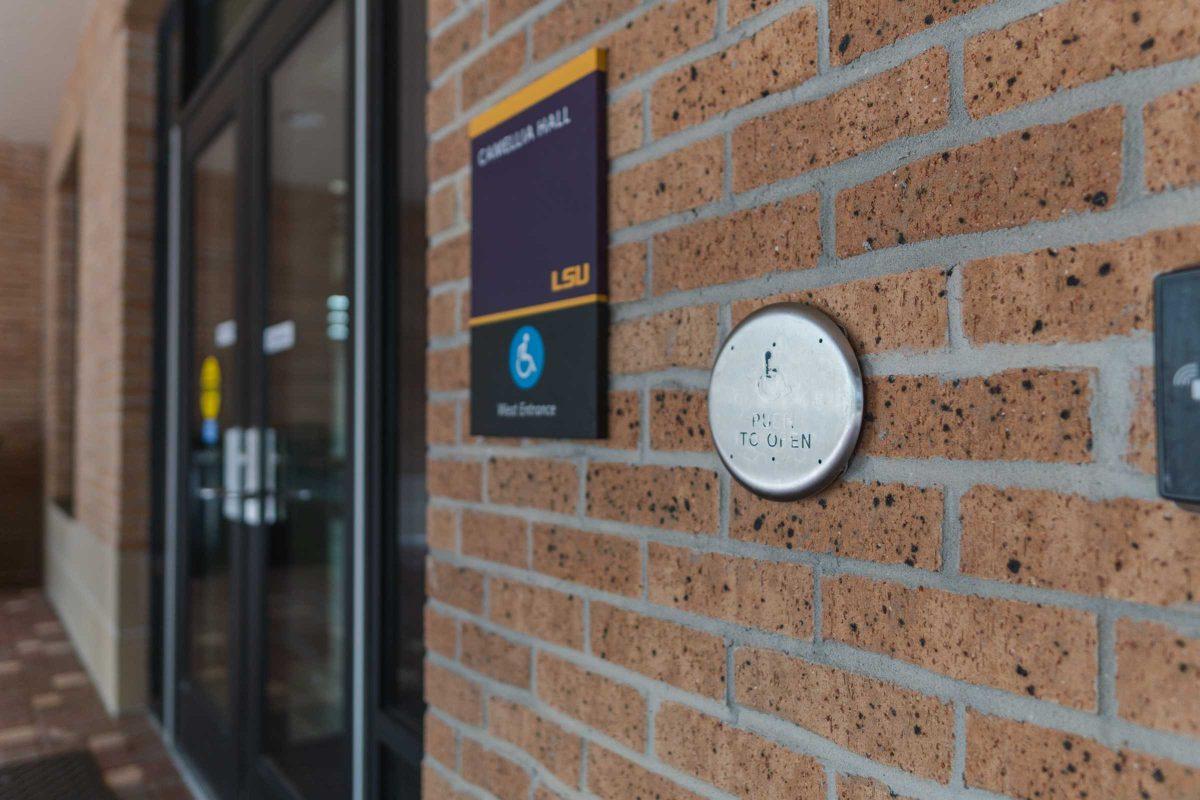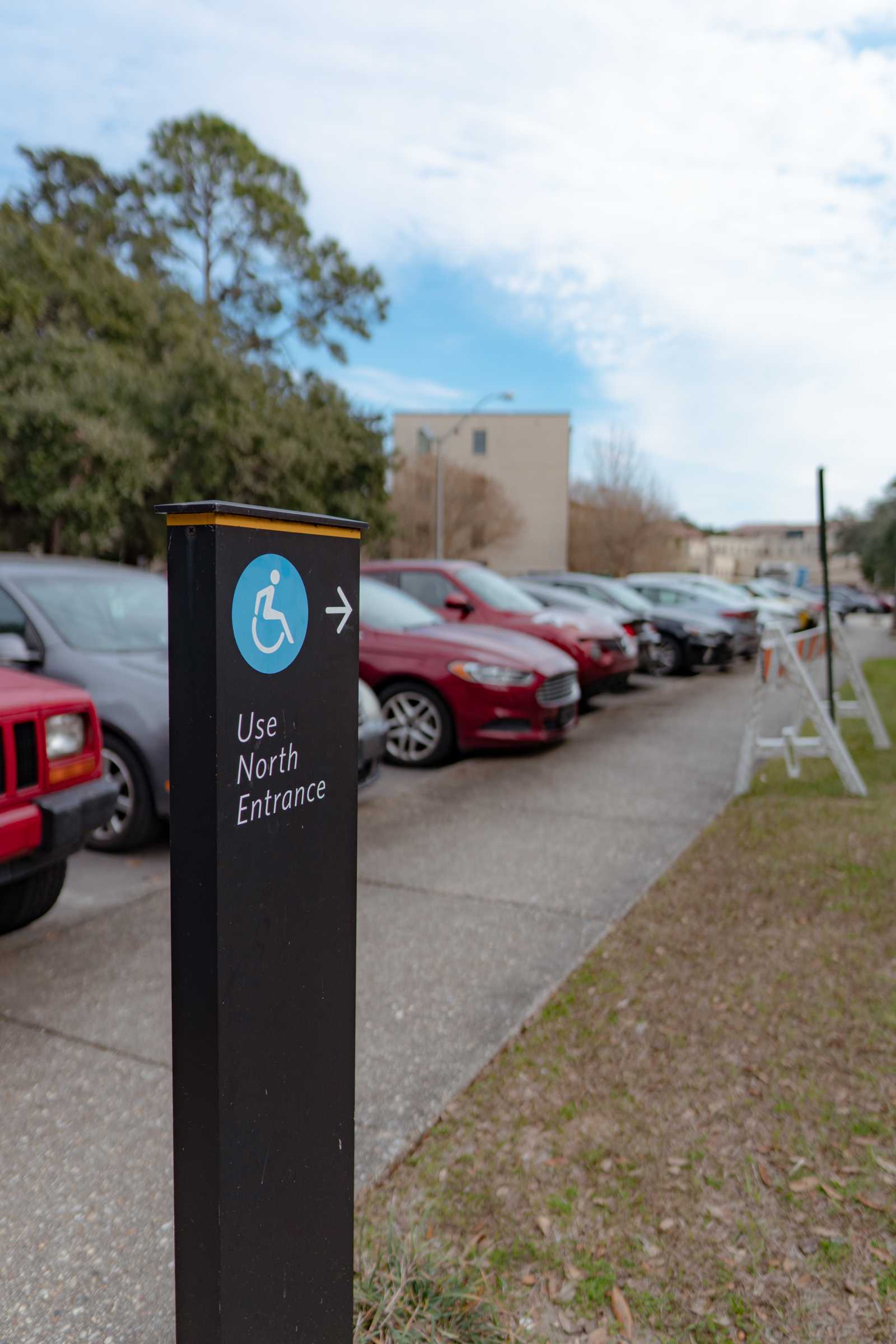Note: Louisiana legislators will decide what to do with a significant surplus of cash available to the state in the next legislative session in March. Ahead of the session, The Reveille is dedicating a string of stories looking at LSU’s infrastructure. This is the fourth story in the ongoing series.
Linda Bui stood next to the opening of the elevator in the Dalrymple building, home to her office and lab. She measured the doorway, which was 27 inches wide – nine inches short of what the American Disability Association requires of openings so people in wheelchairs can enter and exit safely.
If a wheelchair did fit in the elevator, there would not be enough room for the person to turn around and exit without blindly reversing out. Even then, they likely would not want to enter the elevator, which Bui, an environmental science professor, nicknamed the “Tower of Terror.”
On the elevator door, a sign reads “CAUTION! Elevator old and cranky! Please CLOSE gate! Check floor level; enter cautiously! Relevel by running once!”
Bui dreads the day she has a disabled student who will not be able to access her lab on the second floor. She reluctantly tells her students that if they have mobility devices, permanent or temporary, they cannot do work in the lab, a vital part of any science class on campus.
“It’s embarrassing and horrifying that it’s 2022 and we’re still having to discuss disabilities for everyone,” Bui said. “We shouldn’t be having to complain about accessibility for all students.”
Bui said a janitor got stuck on the elevator once and had to be rescued by the Baton Rouge Fire Department. Students have been stuck too, Bui said, and they now avoid the contraption.
Several LSU students have complained of poor disability access on campus, like faulty elevators, broken “push to open” buttons, cracked sidewalks, non-handicapped bathrooms and difficulty obtaining disability recognition through the university’s Disability Services Office.
Blind LSU students have complained about incorrectly marked braille signage around campus and the difficulties they face at LSU.
Jennie Stewart, LSU’s ADA coordinator, said those issues are in the process of being resolved.
“The issue of wayfinding related to braille is a project underway through Facility Services,” Stewart said. “The project should be out to contractors for pricing. Once under contract, the manufacturer will create the signs, which will take a few weeks, with installation soon to follow.”
Both public and private colleges and universities must provide equal access to postsecondary education for students with disabilities, according to the Americans with Disabilities Act of 1990.
Though Stewart nor anyone else in the ADA Office was able to give The Reveille a formal interview, Stewart gave the following statement:
“Disability Services provides accommodations to students, whereas the ADA Coordinator is looking from a 30,000-foot view regarding accessibility, including receiving complaints regarding barriers,” Stewart said. “The other issues haven’t been brought to my attention, but I’d be happy to receive information regarding areas in which concerns exist. Reports help me to identify areas in need of repair and put forward to our Facilities folks for repair.”
‘We Feel Isolated’
When social work junior Kate Pendry broke her foot freshman year, she required a scooter or crutches to get around LSU’s campus. Pendry lived in McVoy Hall at the time, where she says there was no handicap bathroom. Unable to take a shower, Pendry traveled on her scooter to her friend’s separate dorm.
On top of that, LSU’s bumpy and cracked sidewalks made the journeys painful.
“There were so many cracks in all of the concrete and so many bumpy areas that it was impossible to go through without hurting my foot really bad,” Pendry said.
While most LSU buildings have disabled-accessible entrances, Pendry experienced difficulty finding them, as the entrances are often poorly marked or nonexistent.
“The testing center [Himes Hall]—they have a huge staircase to go down,” Pendry said. “I had to throw my scooter down there to take a test. Just those few months were so hard for me around campus. I can’t imagine doing this full time.”
Just getting recognition of a disability is not a seamless process.
Social work junior Allie Moore broke her ankle and has been fighting for recognition of her temporary disability by the university. Pointing to her cast, Moore said she is “obviously broken” and has to travel on campus with a scooter.
“My doctor has to fill out pages long of information when all they need to know is that I have a broken ankle and can’t walk,” Moore said. “They want an overdetailed description, and it’s so annoying that you’re having to go through this because I’m just trying to get to class, and they’re not even helping me a little.”
Only able to walk for more than 10-15 minutes on crutches each outing, Moore requested to move her classes to Zoom. The university denied that request.
“I wish [LSU] understood how much of a struggle it is each day to not be able to walk,” Moore said. “It takes a toll on your mental health. We feel isolated from everyone basically.”
‘It Feels Like a Punishment’
Mass communication and political science junior Kimsey Stewart has a disability affecting her digestion. After meeting with an adviser with LSU’s Disability Services and providing documentation, she was given accommodations that allow excused absences, permission to consume food and water in class and access to the bathroom whenever needed.
She sends her disability papers to her professors at the beginning of every semester so they all understand her accommodations. When emailing one professor at 4 a.m. that she could not attend that day’s class due to her disability, her professor suggested she drop out of school.
“It might be better to sit out this semester in order to recover from your illness,” the email read. “You could retake the class in the spring when you might be better able to concentrate. This is a suggestion rather than a command: only you know your exact physical and mental state.”
A few days later, the professor again suggested Kimsey not attempt to finish the semester.
“I ask once more: are you sure finishing the semester is a good idea?” the second email read. “20 years from now, when you are settled down comfortably somewhere, you will hardly remember that you took an additional four months to finish college because of a health issue.”
“I don’t think a professor should be encouraging a student to drop out of school for any reason,” Kimsey said.
Kimsey, a member of the Kappa Alpha Theta sorority, notices illegal parking in the nearby handicapped parking spots next to the sorority house, even though there are at least four girls in her area that require handicap parking.
She says none of the sorority houses are wheelchair accessible and is trying to bring awareness to the issue.
“I have to call them [LSU Parking and Transportation] every single time someone is parked there,” Kimsey said.
Kimsey said that LSU Parking and Transportation has never taken action to any of her reports.
“It’s not difficult to walk around campus and see problems,” Kimsey said.
History and communications senior Madeline Holmes has hip dysplasia which limits her mobility. When she received a major surgery the past semester, she had to travel campus with crutches for almost two months.
“I’m sitting in the Quad right now, and I can count how many buildings don’t have elevators or fully accessible elevators,” she said.
When she requested to switch classrooms, the university would not allow the professor to do so unless Holmes presented detailed documentation from her doctors. Holmes wasn’t seeing her doctor for another two months and felt her disability should be recognized from the fact she was on crutches.
“There’s so many bureaucratic steps and red tape that I have to go through to get to the accommodations that should be afforded to you in the first place,” Holmes said. “It almost feels like a punishment. I feel like I have to earn my accommodation.”






